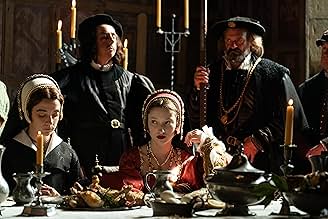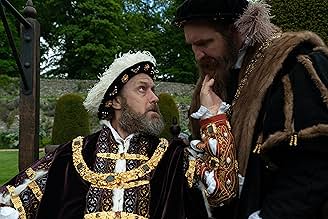PUNTUACIÓN EN IMDb
6,3/10
5,8 mil
TU PUNTUACIÓN
Sigue la historia del matrimonio entre la reina Catherine Parr y Henry VIII.Sigue la historia del matrimonio entre la reina Catherine Parr y Henry VIII.Sigue la historia del matrimonio entre la reina Catherine Parr y Henry VIII.
- Dirección
- Guión
- Reparto principal
- Premios
- 1 premio y 2 nominaciones en total
Linnea Martinsson
- Maud Lane
- (as Linnéa Martinsson)
Lisa Pyk
- Eleanor Browne
- (as Lisa Pyk Wirström)
Reseñas destacadas
Some positive notes: Alicia Vikander is amazing, costume design is great and it's visually stunning.
I don't mind historical inaccuracies. I do care about boring movies. How could it be so boring? The cast is amazing! The costumes are great, the acting is wonderful and the colors are beautiful. Yet, I watched a lot at my watch halfway in.
But, I don't know why, it fails to really entertain. It's not really a thrilling or grim movie but I have a feeling it was supposed to be. Also because it lacks emotion. That's because of the script and not because of Jude Law and Alicia Vikander.
Should you go see this? I'm not sure.
I don't mind historical inaccuracies. I do care about boring movies. How could it be so boring? The cast is amazing! The costumes are great, the acting is wonderful and the colors are beautiful. Yet, I watched a lot at my watch halfway in.
But, I don't know why, it fails to really entertain. It's not really a thrilling or grim movie but I have a feeling it was supposed to be. Also because it lacks emotion. That's because of the script and not because of Jude Law and Alicia Vikander.
Should you go see this? I'm not sure.
Worth seeing movie but there are some significant problems - which are the fault of the director.
The positives: the film is absorbing with good performances, costumes and sets.
But a bunch of negatives, including some completely false presentation of history, particularly regarding Henry VIII's death.
This is unforgivable IMO.
And although the premise of the movie (based on a novel) is Catherine Parr as "feminist" queen, the movie inexplicably omits important information and context that actually illustrate her "feminist" achievements. For example no mention of her backstory (that she was twice a widow by the age of 31 when she was married to Henry VIII) and not clarifying her remarkable educational abilities and accomplishments including that she was fluent in Latin, French and Italian and the first woman in England to publish written work in English. Historians describe her as having good sense, moral rectitude, compassion, firm religious commitment, a strong sense of loyalty and devotion and embracing Henry's children Mary, Elizabeth and Edward.
There are also noticeable and distracting script and social behavior anachronisms - examples such as casual dialogue and contemporary language such as using the word "pregnant" instead of "with child"
Getting back to the director - a man, not British and Firebrand was his first English language film.
Hiring him as the director was a poor decision and disrespectful to the subject matter.
There would have been multiple other good choices - especially people with period piece experience such as Simon Curtis (Downton Abby), Tom Hooper (King's Speech), Stephen Frears.
The positives: the film is absorbing with good performances, costumes and sets.
But a bunch of negatives, including some completely false presentation of history, particularly regarding Henry VIII's death.
This is unforgivable IMO.
And although the premise of the movie (based on a novel) is Catherine Parr as "feminist" queen, the movie inexplicably omits important information and context that actually illustrate her "feminist" achievements. For example no mention of her backstory (that she was twice a widow by the age of 31 when she was married to Henry VIII) and not clarifying her remarkable educational abilities and accomplishments including that she was fluent in Latin, French and Italian and the first woman in England to publish written work in English. Historians describe her as having good sense, moral rectitude, compassion, firm religious commitment, a strong sense of loyalty and devotion and embracing Henry's children Mary, Elizabeth and Edward.
There are also noticeable and distracting script and social behavior anachronisms - examples such as casual dialogue and contemporary language such as using the word "pregnant" instead of "with child"
Getting back to the director - a man, not British and Firebrand was his first English language film.
Hiring him as the director was a poor decision and disrespectful to the subject matter.
There would have been multiple other good choices - especially people with period piece experience such as Simon Curtis (Downton Abby), Tom Hooper (King's Speech), Stephen Frears.
This film is set during the last days of Henry VIII (1546-7), with Jude Law as the King and Alicia Vikander as his sixth and last wife, Catherine Parr, who was also mother in all but name to the king's three children (only one of whom ever knew their actual mother).
The film starts with a caption which says (I forget the exact words) that there are always gaps in our knowledge of history, which we often fill with things we've made up. Well there aren't quite so many gaps as this film seems to suggest. The ending is entirely fictional, and there's at least one plot point that's total fabrication.
Does this matter, given that they were open with us? Probably not. Law is excellent as the sick, dying and paranoid king. Vikander is also excellent as the woman who must constantly tread a microscopically thin line between giving the king the support and affection he needs and becoming the third of his wives to be executed. Simon Russell Beale radiates oily menace as the odious Bishop Gardiner, and the rest of the ensemble cast do a good job in portraying a court torn between jockeying for advancement and fearful of provoking one of the king's irrational outbursts.
I do have one issue with the film: in an early scene we see Erin Doherty as Anne Askew the religious reformer (or radical, depending on your point of view) preaching to her followers in the woods. This is a dramatic and moving scene, and one hopes that Askew is going to feature prominently. She doesn't. Less than two minutes later we learn that Askew has been arrested, tortured and burned at the stake. We see nothing of this, which struck me as a missed opportunity.
That aside, we get a moving and dramatic film which skirts round the edge of actual history.
Oh; and if a King writes a song, of *course* the whole court will learn the words.
The film starts with a caption which says (I forget the exact words) that there are always gaps in our knowledge of history, which we often fill with things we've made up. Well there aren't quite so many gaps as this film seems to suggest. The ending is entirely fictional, and there's at least one plot point that's total fabrication.
Does this matter, given that they were open with us? Probably not. Law is excellent as the sick, dying and paranoid king. Vikander is also excellent as the woman who must constantly tread a microscopically thin line between giving the king the support and affection he needs and becoming the third of his wives to be executed. Simon Russell Beale radiates oily menace as the odious Bishop Gardiner, and the rest of the ensemble cast do a good job in portraying a court torn between jockeying for advancement and fearful of provoking one of the king's irrational outbursts.
I do have one issue with the film: in an early scene we see Erin Doherty as Anne Askew the religious reformer (or radical, depending on your point of view) preaching to her followers in the woods. This is a dramatic and moving scene, and one hopes that Askew is going to feature prominently. She doesn't. Less than two minutes later we learn that Askew has been arrested, tortured and burned at the stake. We see nothing of this, which struck me as a missed opportunity.
That aside, we get a moving and dramatic film which skirts round the edge of actual history.
Oh; and if a King writes a song, of *course* the whole court will learn the words.
I began watching the movie without reading anything about it but the people involved.
10 minutes in the film and I get the same claustrophobic feeling you get when you feel that everything around you hangs by a thread and every word could be a threat to your very existence.
Some people haven't lived with a psycho or a narcissist. Those who have would be quite quick to realise the portrait of Henry that Jude Law was going for. I watched the entirety of the film thinking about how narcissists exploit everyone around them, making them walk on eggshells constantly, belittling them with tough, stingy remarks that look like jokes while you know that they could become a flood hitting your face next. Henry's grip on everyone around him is proportional to the power he was wielding at that time, a king appointed by God who was questioned by no one. He has absolute power of everyone around him and he is expecting others to dance at his whim while he enjoys watching them squirm and twist to predict his uncontrollable fits of rage or loosing his favour.
Towards the end of the film I realised what psychologists speak about when they mention that a narcissist destroys many people around him and/or takes them down with him because he senses his end.
The whole story could have been an essay about women in the blood soaked Tudorian era trying to survive within the confounds of a male designed and controlled society. But, it was rather a portrait of a deranged fill with grandiose narcissist who thought others were his toys. Surely, ecclesiastical zealous and the reform and other subjects were touched, but with no particular strength or adequate given time to see them through.
Jude Law and Alicia Vicader were excellent in their roles. I would recommend the watch.
10 minutes in the film and I get the same claustrophobic feeling you get when you feel that everything around you hangs by a thread and every word could be a threat to your very existence.
Some people haven't lived with a psycho or a narcissist. Those who have would be quite quick to realise the portrait of Henry that Jude Law was going for. I watched the entirety of the film thinking about how narcissists exploit everyone around them, making them walk on eggshells constantly, belittling them with tough, stingy remarks that look like jokes while you know that they could become a flood hitting your face next. Henry's grip on everyone around him is proportional to the power he was wielding at that time, a king appointed by God who was questioned by no one. He has absolute power of everyone around him and he is expecting others to dance at his whim while he enjoys watching them squirm and twist to predict his uncontrollable fits of rage or loosing his favour.
Towards the end of the film I realised what psychologists speak about when they mention that a narcissist destroys many people around him and/or takes them down with him because he senses his end.
The whole story could have been an essay about women in the blood soaked Tudorian era trying to survive within the confounds of a male designed and controlled society. But, it was rather a portrait of a deranged fill with grandiose narcissist who thought others were his toys. Surely, ecclesiastical zealous and the reform and other subjects were touched, but with no particular strength or adequate given time to see them through.
Jude Law and Alicia Vicader were excellent in their roles. I would recommend the watch.
This beautifully shot and meticulously cut film is far better than the reviews suggest, and the performances are all first-rate.
I wasn't expecting the story to be in any way accurate - and I am fairly clued up on Henry the Eigth - and it isn't. But despite that the film works really well.
June Law is the BEST dipiction of an elderly, dying Henry VIII, I give his performance 10 stars.
The film is loosely tied to real events, with one exception and to that, later.
The setting in Haddon Hall, the building works perfectly, the Tudor period and its inhabitants were still quite medieval animals, with rare exceptions, and about 100 years behind their European contemporaries (see Chambord for example). Not until Charles I can England be described as having an emerging Renaissance culture. The clothes, head-dresses, jewellery, furniture are all deliciously vernacular, as is the Latin liturgy (which is helpfully translated using subtitles) as the setting is pre-Common Prayer - just).
So, the overrall flavour of Tudor Court life shown as a primitive and cruel place, given licence by a wilful, cruel and despotic king, is bang-on. The depiction of Elizabeth Parr's endurance of unspeakable treatment in a loveless, selfless marriage to an utterly unpredictable and boorish, selfish, old man - who also happens to be King and wields absolute power - quite justifies the finale which is THE ultimate wish fulfillment of all battered and abused wives everywhere!
Enjoy the film, and the less English history you know, the better it gets.
I wasn't expecting the story to be in any way accurate - and I am fairly clued up on Henry the Eigth - and it isn't. But despite that the film works really well.
June Law is the BEST dipiction of an elderly, dying Henry VIII, I give his performance 10 stars.
The film is loosely tied to real events, with one exception and to that, later.
The setting in Haddon Hall, the building works perfectly, the Tudor period and its inhabitants were still quite medieval animals, with rare exceptions, and about 100 years behind their European contemporaries (see Chambord for example). Not until Charles I can England be described as having an emerging Renaissance culture. The clothes, head-dresses, jewellery, furniture are all deliciously vernacular, as is the Latin liturgy (which is helpfully translated using subtitles) as the setting is pre-Common Prayer - just).
So, the overrall flavour of Tudor Court life shown as a primitive and cruel place, given licence by a wilful, cruel and despotic king, is bang-on. The depiction of Elizabeth Parr's endurance of unspeakable treatment in a loveless, selfless marriage to an utterly unpredictable and boorish, selfish, old man - who also happens to be King and wields absolute power - quite justifies the finale which is THE ultimate wish fulfillment of all battered and abused wives everywhere!
Enjoy the film, and the less English history you know, the better it gets.
¿Sabías que...?
- CuriosidadesJude Law wore a scent that smelled like "blood, fecal matter, and sweat" while performing his role of Henry VIII. "I thought it would have a great impact if I smelt awful", he said at a Cannes Film Festival press conference.
- PifiasKatherine Parr was not arrested in the presence of the king, nor was she dragged off to a dungeon. The warrant for her arrest was dropped, and found by a loyal servant, who brought it straight to her. Katherine completely lost her composure at seeing the king's signature on the document, and began to cry and scream. Henry heard her, and sent a servant to see what was the matter. When he found out, he sent word for her not to worry, and received her the next day. Katherine had learned her lesson; she was submissive and humble to Henry from then on, and he remanded her arrest warrant. Ultimately, her life was saved by his death.
Selecciones populares
Inicia sesión para calificar y añadir a tu lista para recibir recomendaciones personalizadas
- How long is Firebrand?Con tecnología de Alexa
Detalles
- Fecha de lanzamiento
- Países de origen
- Sitios oficiales
- Idioma
- Títulos en diferentes países
- La Reina De Fuego
- Localizaciones del rodaje
- Empresas productoras
- Ver más compañías en los créditos en IMDbPro
Taquilla
- Recaudación en Estados Unidos y Canadá
- 521.366 US$
- Fin de semana de estreno en EE. UU. y Canadá
- 233.373 US$
- 16 jun 2024
- Recaudación en todo el mundo
- 4.525.819 US$
- Duración2 horas 1 minuto
- Color
- Mezcla de sonido
- Relación de aspecto
- 2.39 : 1
Contribuir a esta página
Sugerir un cambio o añadir el contenido que falta

Principal laguna de datos
What is the Hindi language plot outline for La última reina (Firebrand) (2023)?
Responde

































